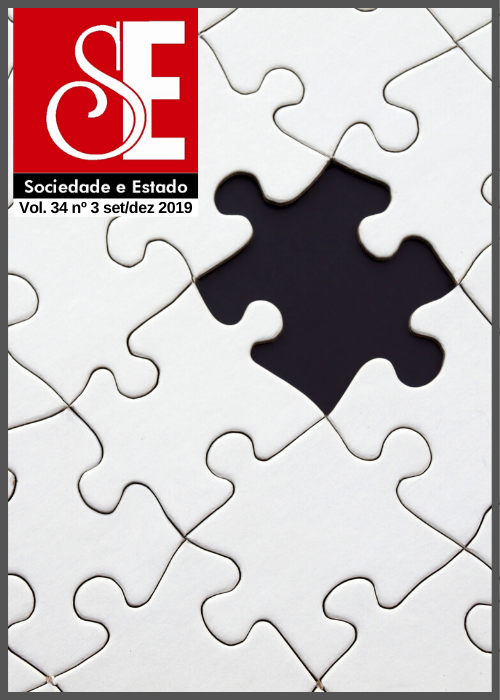Teoria dos Sistemas de Exclusão: Sobre o Conflito entre a Estatalidade de Bem-Estar social e a Globalização dos Sistemas Funcionais*
Keywords:
Inclusion, exclusion, welfare state, functional system, world societyAbstract
The present essay first outlines the sociological guiding distinction between inclusion and exclusion (exclusion within society, communication based on all events). It presents the functional differentiation of world society as the pri- mary form of differentiation. But if society is so described, what are the main causes of the occurrence of exclusion? Two of these causes are discussed in this text. First, the welfare state was the central instrument for promoting inclusion and absorption of exclusions. But if the welfare state’s reach remains regional and the other functional systems rest on global contexts that the welfare state can no longer successfully intervene in, exclusions become more likely again. Second, exclusions increases when two or more functional systems intermesh in their operations. Then, exclusions are no longer localized and at the same time functionally limited edge positions of the individuals, but are linked to systematic patterns across several functional systems.
Downloads
References
BAECKER, Dirk. »Soziale Hilfe als Funktionssystem der Gesellschaft«, in: Zeitschrift für Soziologie 23 (1994), S. 93-110.
BERRY, Sara. »Social Institutions and Access to Resources« in: Africa 559(1939). S. 41-55.
BESSET, Jean Paul. »Les exclus convergent vers les zones rurales dämunies« in: Le Monde, 9.Januar 1999, S.8.
BOMMES, Michael; HALLMANN, Jost. »Migration und Inklusion. Spannungen zwischen Nationalstaat und Wohlfahrtsstaat«, in: Kölner Zeitschrift für Soziologie und Sozialpsychologie 46 (1994), S.406-424.
BOURDIEU, Pierre. »Ökonomisches Kapital, kulturelles Kapital, soziales Kapitals«, in: Reinhard Kreckel (Hg.), Soziale Ungleichheiten (=Soziale Welt, Sonderband 2), Göttingen 1983, S. 133-198.
EPSTEIN, Helen. »Life & Death on the Social Ladder«, in: New York Review of Books 45,H.12, 16. Juli 1998, S. 26 - 30.
FOUCAULT, Michel. »La vérité et les formes juridiques«, in: ders., Dits et Ecrits, 1954-1988 Bd.2, 1970-1975, Paris 1994, S. 538-646.
FOUCAULT, Michel. Überwachen und Strafen. Die Geburt des Gefängnisses, Frankfurt/M. 1976 (=1975).
FUCHS, Peter. »Adressabilität als Grundbegriff der soziologischen Systemtheorien«, in: Soziale Systeme 3 (1997), S. 57 -79.
FUCHS, Peter. »Weder Herd noch Heimstatt - Weder Fall noch Nichtfall. Doppelte Differenzierung im Mittelalter und in der Moderne«, in: Soziale Systeme 3 (1997), S. 413 -437 (=1997a).
FUCHS, Peter; BUHROW, Dietrich; KRüGER, Michael. »Die Widerständigkeit von Behinderten. Zu Problemen der Inklusion/Exklusion von Behinderten in der ehemaligen DDR«, in: FUCHS, Peter; GÖBEL, Andreas (Hg.), Der Mensch - das Medium der Gesellschaft, Frankfurt/M. 1994, S. 239-263.
FUCHS, Peter; SCHNEIDER, Dietrich. »Das Hauptmann””von-Köpenick-Syndrom. Überlegungen zur Zukunft funktionaler Differenzierung«, in: Soziale Systeme 1 (1995), S. 203-204.
GAMSON, William A.. »Hiroshima, the Holocaust, and the Politics of Exclusion-, in: American Sociological Review 6o (1995), S. 1-20.
HAHN, Alois. »Identität und Nation in Europas«, in: Berliner Journal für Soziologie 3 (1993), S. 193-103.
LUHMANN, Niklas. Funktion der Religion, Frankfurt. 1977.
LUHMANN, Niklas. Politische Theorie im Wohlfahrtsstaat, München und Wien 1981.
LUHMANN, Niklas. »Individuum, Individualität, Individualismus, in: ders., Gesellschaftsstruktur und Semantik. Studien zur Wissenssoziologie der modernen Gesellschaft, Bd 3, Frankfurt/M. 1989, S.149-258.
LUHMANN, Niklas. Das Recht der Gesellschaft, Frankfurt/M. 1993.
LUHMANN, Niklas. Inklusion und Exklusion, in: ders., Soziologische Aufklärung 6, Opladen 1995, S. 237-264.
LUHMANN, N.; SCHORR. K.E. Reflexionsprobleme in Erziehungsysteme. Stuttgart. 1979.
MARSHALL, T. H.. Class, Citizenship, and Social Development, Garden City 1964.
MERRIEN, Francois-Xavier. »État-providence et lutte contre l’exclusion«, in: Serge Paugam (Hg.), L’exclusion: l’état des savoirs, Paris 1996, S. 417 -417.
MINGIONE, Enzo; MORLICCHIO, Enrica. »New Forms of Urban Poverty in Italy: Risk Path Models in the North and the South«, in; International Journal of Urban and Regional Research 17 (1993), S. 413-417.
MOFFETT, Matt. »Slavery Continues To Haunt Humanity At End of Millennium«, in: The Wall Street Journal Europe, 14. Januar 1999, S. 1-12.
MURRAY, Charles. »And Now for the Bad News«, in: The Wall Street Journal Europe, 3. Februar 1999, S. 6.
NADEL, Siegfried F.. The Theory of Social Structure, London 1957.
PARSONS, Talcott. Social Systems and die Evolution of Action Theory, New York (1971).
PARSONS, Talcott. Action Theory and the Human Condition, New York (1978)
SILVER, Hilary. »Reconceptualizing Social Disadvantage: Three Paradigms of Social Exclusion«, in: Gerry Rodgers et al. (Hg.), Social Exciusion: Rhetoric, Reality. Responses, Genf 1995, S. 57-80.
STICHWEH, Rudolf. »Inklusion in Funktionssysteme der modernen Gesellschafts«, in: Renate Mayntz et al., Differenzierung und Verselbständigung. Zur Entwicklung gesellscbaftlicher Teilsysteme, Frankfurt/M. 1988, S. 261-293.
STICHWEH, Rudolf. Der frühmoderne Staat und die europäische Universität. Zur Interaktion von Politik und Erziehungssystem im Prozeß ihrer Ausdifferenzierung (16.-18. Jahrhundert), Frankfurt/M. 1991.
STICHWEH, Rudolf. »Nation und Weltgesellschaft«, in: ESTEL, Bernd; MAYER, Tilman (Hg.), Das Prinzip Nation in modernen Gesellschaften. Länderdiagnosen und theoretische Perspektiven, Opladen 1994; S. 83-96 (in diesem Band: Kap. 3).
STICHWEH, Rudolf. »Inklusion/Exklusion, funktionale Differenzierung und die Theorie der Weltgesellschaft«, Soziale Systeme 3 (1997), S.123-136
STICHWEH, Rudolf. Zur Theorie der politischen Inklusions, in: Berliner Journal für Soziologie 8 (1993), S. 539 - 547.
STICHWEH, Rudolf. »Professionen im System der modernen Gesellschaft«, in: MERTEN, Roland (Hg.), Systemtheorie Sozialer Arbeit. Neue Ansätze und veränderte Perspektiven, Opladen 2000, S. 29-38.
STOLLEIS, Michael. Geschichte des öffentlichen Rechts in Deutschland. Bd. 1. Reichspublizistik und Policywissenschaft 1600-1800, München 1988.
WALLERSTEIN, Immanuel. The Modern World””System. Capitalist Agriculture und the Origins of the European World””Economy in the Sixteenth Century, New York 1974.
ZIEMANN, Andreas. »Die eingeschlossenen Ausgeschlossenen. Zur Problematik funktionaler Totalinklusion im Rahmen des Strafvollzugsgesetzes, in: Soziale Systeme 4 (1998), 31 ””57.
Referências Bibliográficas da Tradução:
BACHUR, J. P. A diferenciação funcional da religião na teoria social de Niklas Luhman. Revista Brasileira de Ciências Sociais, n. 76, Junho 2011.
LUHMANN, N. La ciencia de la sociedad. Universidad Iberoameriana/ITESO/Anthropos, 1996.
LUHMANN, N. Social Systems. California: Stanford University Press, 1996.
LUHMANN, N. La Sociedad de la Sociedad. Mexico: Universidad Iberoamericana, 2006.
LUHMANN, N. Sistemas Sociais: esboço de uma teoria geral. Petrópolis: VOZES, 2016. (Coleção Sociologia). ISBN 9788532652331.
RIBEIRO, P. H. Luhmann “fora do lugar”? como a “condição periférica” da América Latina impulsionou deslocamentos na teoria dos sistemas. Revista Brasileira de Ciências Sociais, v. 28, n. 83, p. 105”“237, outubro 2013.
STICHWEH, R. Bringing sociology to internation relations. world politics as diferentiation theory. In: Cambridge: Cambridge University Press., 2013. cap. The history and systematics of functional differentiation in sociology, p. 50”“70.
WEICK, K. E. Educational organizations as loosely coupled systems. Administrative Science Quarterly, v. 21, n. 1, p. 1”“19, March 1976.




.jpg)



















